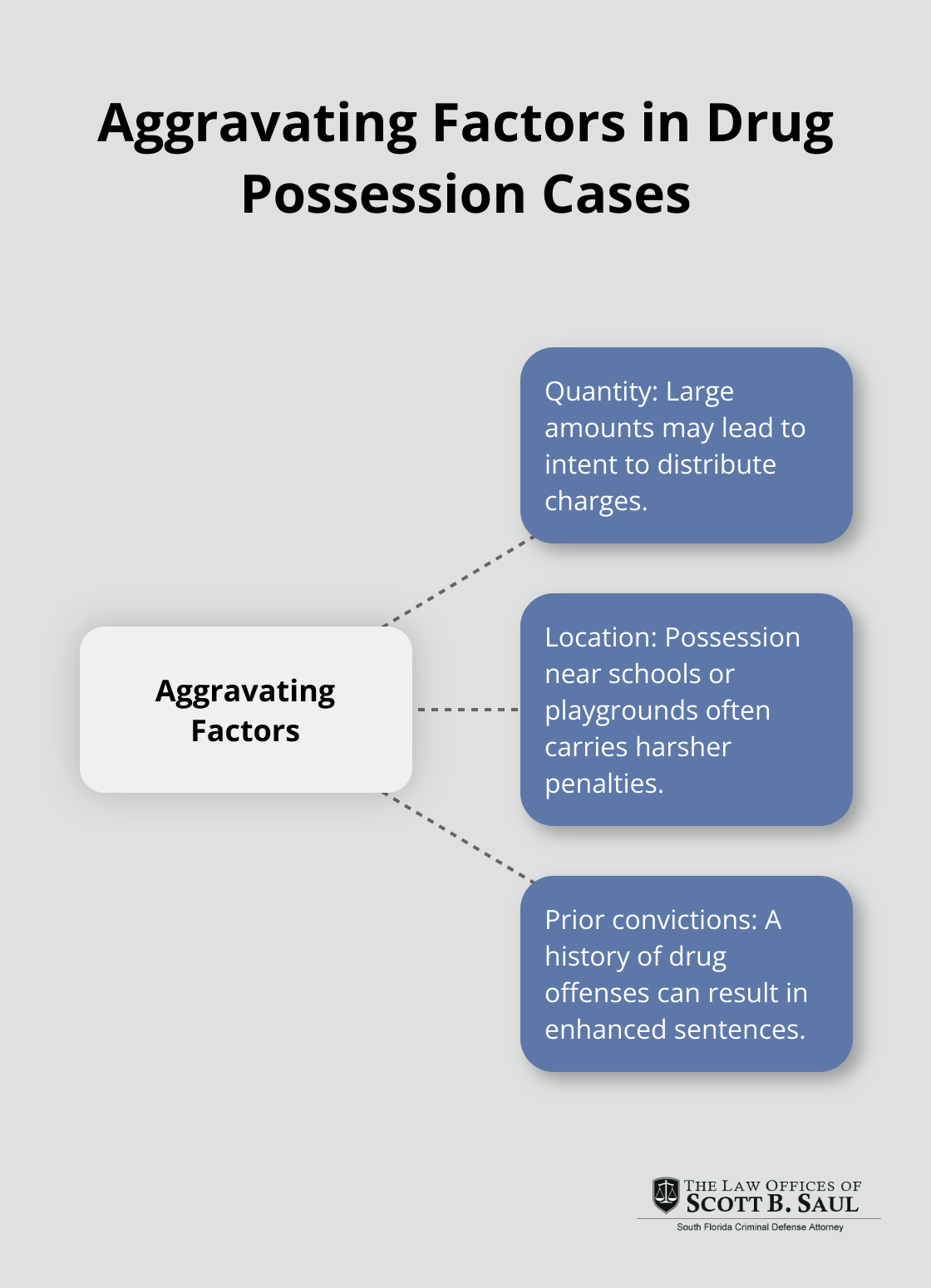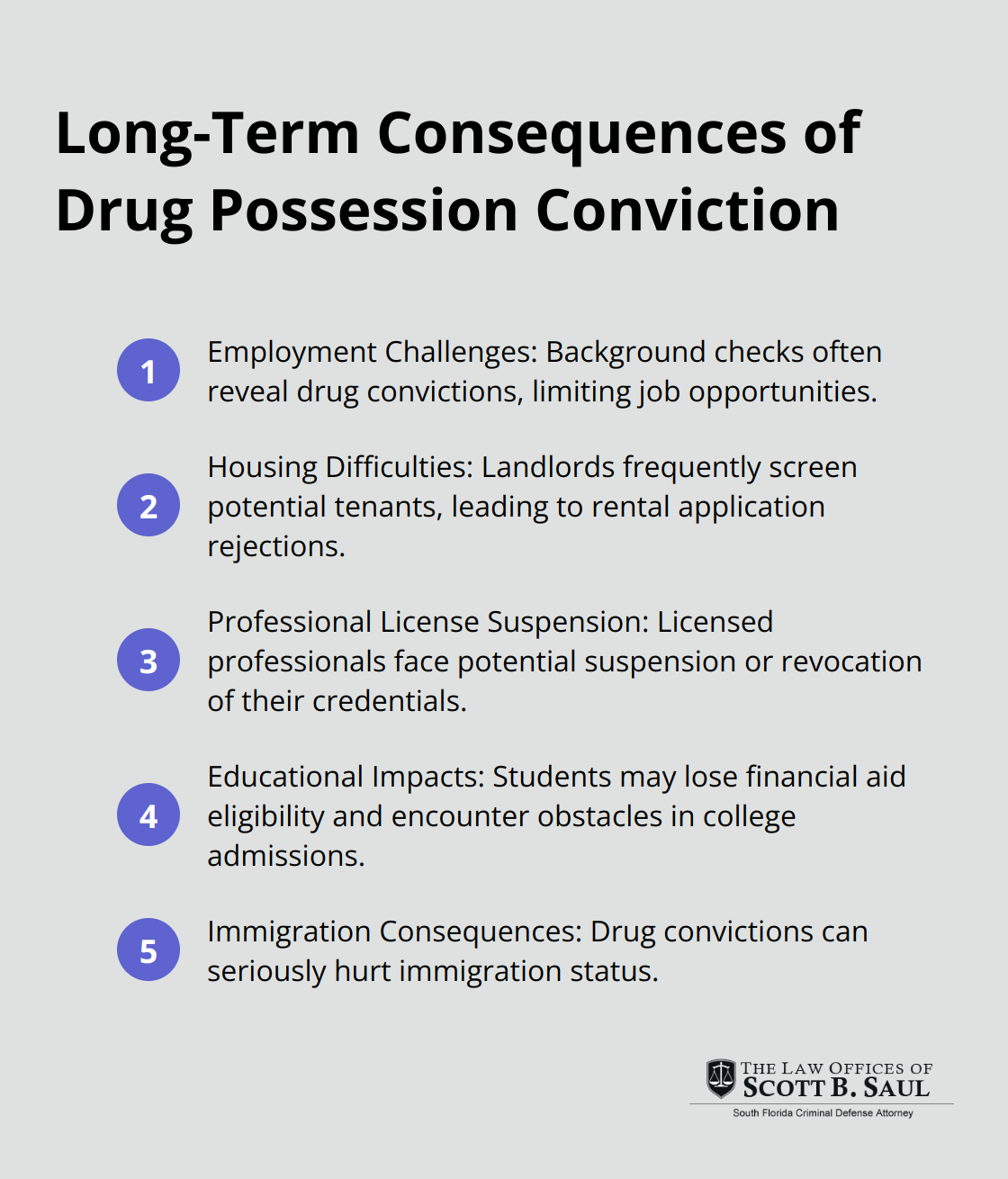What Is Possession of a Dangerous Drug?
By : saulcrim | Category : Criminal Defense | Comments Off on What Is Possession of a Dangerous Drug?
18th Aug 2025

At Law Offices of Scott B. Saul, we often encounter clients asking, “What is possession of a dangerous drug?” This question is more complex than it might seem at first glance.
Understanding the legal definition and implications of dangerous drug possession is vital for anyone facing such charges. In this post, we’ll break down the key elements of this offense and discuss potential consequences.
What Are Dangerous Drugs?
Legal Definition and Classification
Texas law defines dangerous drugs as substances unsafe for self-medication and not classified under the Controlled Substances Act. This category encompasses a broad spectrum of prescription medications that, while legal with proper authorization, can pose risks if misused.
The Texas Dangerous Drug Act establishes the regulations for these substances. Unlike controlled substances (categorized into five schedules based on abuse potential), dangerous drugs are defined by their requirement for professional medical supervision.
Common Examples
Dangerous drugs include:
- Antibiotics
- Antidepressants
- Certain pain medications
- Benzodiazepines (e.g., Xanax and Valium for anxiety treatment)
These medications require a valid prescription from a licensed medical professional for legal possession.
Storage and Handling Requirements
Even legally obtained dangerous drugs can lead to criminal charges if not properly stored or carried. The Texas Health and Safety Code mandates that dangerous drug containers clearly indicate the need for a prescription. Transferring prescription medication to an unmarked container could result in legal issues.
Consequences of Illegal Possession
Possession of a dangerous drug without a valid prescription typically results in a Class A misdemeanor charge in Texas. Penalties may include:

Legal Complexities and Defense Strategies
The intricacies of dangerous drug laws often lead to misunderstandings about proper drug storage or prescription requirements. These complexities underscore the importance of experienced legal representation in such cases.
Attorneys with backgrounds as former prosecutors (like those at Law Offices of Scott B. Saul) possess unique insights into case construction and prosecution. This experience allows for the development of strong defense strategies tailored to each client’s specific situation.
As we move forward, let’s examine the specific elements that constitute possession of a dangerous drug and how these factors impact legal proceedings.
What Constitutes Possession of a Dangerous Drug?
Physical vs. Constructive Possession
The law recognizes two types of possession: physical and constructive. Physical possession occurs when the drug is found on your person. Constructive possession applies when you have control over an area where drugs are found (e.g., your car or home).
A recent case illustrates this distinction. Police found prescription pills in a client’s car glove compartment. We argued successfully that he had no knowledge of their presence, as he had recently purchased the car second-hand. This case highlights the importance of understanding constructive possession in building a strong defense.
Knowledge and Intent
Prosecutors must prove that you knowingly possessed the dangerous drug. This means you were aware of its presence and nature. Intent to use or distribute isn’t necessary for a possession charge, but it can affect the severity of penalties.
Prosecutors also fail to disclose evidence that is in the hands of police, sheriffs, crime laboratories, and other government agencies. This fact underscores the critical role these elements play in drug possession cases.
Aggravating Factors
Several factors can increase the severity of charges:

For example, in Texas, possession of a dangerous drug within 1,000 feet of a school can elevate a misdemeanor to a state jail felony (potentially increasing jail time).
The Role of Legal Representation
Understanding these elements proves essential for anyone facing dangerous drug possession charges. Experienced attorneys (like those at Law Offices of Scott B. Saul) can leverage their knowledge, including insights from backgrounds as former prosecutors, to build robust defenses tailored to each client’s unique circumstances.
The complexities of dangerous drug possession cases underscore the importance of skilled legal representation. As we move forward, we’ll examine the specific penalties associated with these charges and their potential long-term impacts.
What Are the Penalties for Dangerous Drug Possession?
Misdemeanor Charges and Their Implications
Texas law classifies most first-time offenses for possession of a dangerous drug as Class A misdemeanors. The penalties for possessing a dangerous drug can vary significantly based on the details of the case. First-time offenders typically face less severe consequences compared to repeat offenders.
A recent case illustrates the potential for alternative outcomes. A client facing a first-time dangerous drug possession charge avoided jail time through a plea bargain that included probation and mandatory drug education classes. This outcome underscores the value of experienced legal representation in negotiating favorable terms.
Felony Charges for Dangerous Drug Possession
Certain circumstances elevate dangerous drug possession to a felony charge:
- Possession of a large quantity of the drug
- Intent to distribute
- Possession in a drug-free zone (e.g., near schools or playgrounds)
- Prior drug convictions
Felony charges for dangerous drug possession result in state jail time ranging from 180 days to two years and fines up to $10,000. More severe cases (involving large quantities or distribution) increase penalties to 2-10 years in prison.
Long-Term Consequences Beyond Legal Penalties
A dangerous drug possession conviction impacts far beyond fines and potential imprisonment. These long-term consequences affect an individual’s personal and professional life:

Impact on Driving Privileges
A conviction for dangerous drug possession often leads to a six-month driver’s license suspension in Texas. This restriction can significantly disrupt daily life, affecting employment, education, and personal responsibilities.
The Importance of Strong Legal Defense
These far-reaching effects highlight the critical need for a robust defense against dangerous drug possession charges. Proactive legal strategies often mitigate long-term consequences, resulting in reduced charges or case dismissals (as experienced by clients of Law Offices of Scott B. Saul).
Final Thoughts
Possession of a dangerous drug involves complex legal issues with severe consequences. These substances include various prescription medications that require proper authorization and handling. The penalties for dangerous drug possession range from misdemeanors to felonies, depending on factors such as quantity, location, and prior convictions.
A conviction for dangerous drug possession can significantly impact employment, housing, professional licenses, and immigration status. The potential six-month driver’s license suspension further disrupts daily life. These far-reaching effects highlight the need for strong legal defense against such charges.
At Law Offices of Scott B. Saul, we bring decades of criminal defense expertise to every case. We specialize in defending tourists and foreign travelers facing drug charges in South Florida. If you ask “What is possession of a dangerous drug?” or face related charges, contact us for a comprehensive consultation.
Archives
- January 2026 (6)
- December 2025 (9)
- November 2025 (8)
- October 2025 (8)
- September 2025 (9)
- August 2025 (8)
- July 2025 (8)
- June 2025 (9)
- May 2025 (9)
- April 2025 (8)
- March 2025 (9)
- February 2025 (8)
- January 2025 (9)
- December 2024 (10)
- November 2024 (5)
- July 2024 (2)
- June 2024 (2)
- May 2024 (2)
- April 2024 (2)
- March 2024 (2)
- February 2024 (2)
- January 2024 (2)
- December 2023 (2)
- November 2023 (2)
- October 2023 (2)
- September 2023 (2)
- August 2023 (1)
- July 2023 (2)
- June 2023 (2)
- May 2023 (2)
- April 2023 (2)
- March 2023 (2)
- February 2023 (2)
- January 2023 (2)
- December 2022 (2)
- November 2022 (2)
- October 2022 (2)
- September 2022 (2)
- August 2022 (2)
- July 2022 (2)
- June 2022 (2)
- May 2022 (2)
- April 2022 (2)
- March 2022 (2)
- February 2022 (2)
- January 2022 (2)
- December 2021 (2)
- November 2021 (2)
- October 2021 (2)
- September 2021 (2)
- August 2021 (2)
- July 2021 (2)
- June 2021 (2)
- May 2021 (2)
- April 2021 (2)
- September 2020 (5)
- July 2020 (4)
- June 2020 (4)
- May 2020 (4)
- April 2020 (5)
- March 2020 (4)
- February 2020 (4)
- January 2020 (4)
- December 2019 (1)
- November 2019 (4)
- October 2019 (4)
- September 2019 (4)
- August 2019 (4)
- July 2019 (5)
- June 2019 (4)
- May 2019 (4)
- April 2019 (4)
- March 2019 (4)
- February 2019 (4)
- January 2019 (4)
- December 2018 (4)
- November 2018 (5)
- October 2018 (5)
- September 2018 (4)
- August 2018 (4)
- July 2018 (7)
- June 2018 (4)
- May 2018 (4)
- April 2018 (8)
- March 2018 (4)
- February 2018 (4)
- January 2018 (4)
- November 2017 (4)
- October 2017 (4)
- September 2017 (4)
- August 2017 (7)
- July 2017 (6)
- June 2017 (4)
- May 2017 (4)
- April 2017 (4)
- March 2017 (4)
- February 2017 (7)
- January 2017 (4)
- December 2016 (7)
- November 2016 (4)
- October 2016 (4)
- September 2016 (10)
- August 2016 (4)
- July 2016 (4)
- June 2016 (4)
- May 2016 (4)
- April 2016 (4)
- March 2016 (4)
- February 2016 (7)
- January 2016 (4)
- December 2015 (5)
- November 2015 (4)
- October 2015 (7)
- September 2015 (4)
- August 2015 (4)
- July 2015 (13)
- June 2015 (9)
- May 2015 (8)
- April 2015 (6)
- March 2015 (4)
- February 2015 (4)
- January 2015 (4)
- December 2014 (4)
- November 2014 (4)
- October 2014 (4)
- September 2014 (3)
Categories
- Adjudication (1)
- Bankruptcy (1)
- Burglary Crimes (3)
- calendar call (1)
- Car Accident (1)
- Criminal Defense (387)
- Cyber Crimes (7)
- DNA (1)
- Domestic Violence (9)
- Drug Crimes (5)
- DUI (12)
- Embezzlement (1)
- Environmental Crimes (4)
- Expungement Law (2)
- Federal Sentencing Law (3)
- Firearm (3)
- Forgery (4)
- General (82)
- Healthcare (3)
- Immigration (1)
- Indentity Theft (1)
- Insurance (5)
- judicial sounding (2)
- Juvenile Crimes (4)
- Manslaughter (4)
- Money Laundering (3)
- Organized Crime (1)
- Racketeering (1)
- Reckless Driving (3)
- RICO (3)
- Sealing and Expunging (2)
- Sex Offense (1)
- Shoplifting (1)
- Suspended Driver's License (1)
- Traffic (4)
- Trending Topics (1)
- White-collar Offenses (1)

